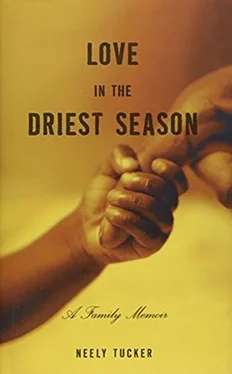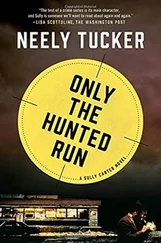I listened as she told me her family history, which also had its roots in the Deep South. Her father, Phil Griffin, grew up in south Alabama, a postage stamp of a place called Enterprise. There was not much of what you might call upward mobility for a black man in those days. So Phil, already in his twenties when the Depression hit, joined the Great Migration of rural blacks to the urban north. Married, with three children and more on the way, he moved to Cincinnati and then to River Rouge, a suburb of Detroit, before moving into the city proper. He was a painter of cars at a time when almost every other automobile manufactured anywhere in the world came out of Detroit, and he moved his family from house to house as his salary improved. His wife, Ida Helen, was a seamstress of leather covers for car seats and then of softer fabrics for sofa cushions. They had fish fries on Friday evenings, played cards with friends, and kept a small vegetable garden in the backyard.
When Vita was a little girl, they would make the meandering trip down south each summer to visit relatives. Once across the Mason-Dixon, her father would sometimes stop the car when he saw black prisoners on a chain gang. He would offer cigarettes to the boss man, asking that they be distributed to the inmates. He would urge his children to smile and wave at the hammer swingers, offering them some small moment of kindness. He told his children of the injustice that led many of the men to be in stripes. These roadside courtesies ended abruptly at the Mississippi state line. In fact, Phil Griffin refused to stop his car in the Magnolia State at all.
“You had to pee in Memphis and hold it all the way through Mississippi,” Vita remembered. “That place was so bad that, as a black person from Detroit, you were actually grateful to get to Alabama. ”
It would occur to me, sitting there beside her, that she had been scared of all the people I had grown up with and loved. It was an unpleasant sensation, but we came to share an unspoken understanding that the past did not have to dictate the future. We let our relationship develop-in fits and starts, with breakups and reunions-like most any other couple. Of course, some people gave me grief for dating a black woman-did I have some sort of Deep South fetish? Was I trying to prove something? This bothered me a great deal at first, but I learned to ignore it. Once people know you’re from Mississippi, I discovered, they tend to place you in a box. (The number one thing people have said to me at dinner parties all over the world: “You don’t look/act/sound like you’re from Mississippi.” It’s as if, even in Beirut, people expect me to walk around barefoot in overalls, whistling “Dixie.”) Such generalizations lead to misunderstandings, because most people not from the Deep South assume that white and black cultures there are polar opposites, which is inaccurate. Things were perverse for more than three centuries, they were violent and disturbed, but daily life among whites and blacks was and is not in diametrical opposition. In fact, it seemed to me there was a distinct cultural overlap between white and black rural southerners, from the foods they ate to what they did for a living (farm), the land they worked, and the ponds they fished-even to a type of personal warmth that other people in the nation simply didn’t share. Exhibit A in this theory is Bill Clinton, a small-town Arkansas boy affectionately (or sardonically) referred to by black comedians, and even Toni Morrison, as the “first black president.” He’s even in the Arkansas Black Hall of Fame.
I had never really thought about this before I moved to Detroit. But the longer I dated Vita, the clearer it became that I often had more in common with her and many of Detroit’s working-class black residents than I did with most of Michigan’s white folks. What they called soul food in Detroit, for example, collard greens and black-eyed peas and corn bread and baby-back ribs and fried chicken, was the same fare I had grown up on. (The last meal my grandmother cooked for me was pork neck bones and collards; the first dinner I ate at Vita’s mother’s house was fried catfish and collards.) The sense of humor was similar, as was the pattern and pace of the spoken language, something more languid and indirect and expansive than the clipped English of many of my white compadres. Baptist was the most common religious affiliation, for better or worse. And I came to notice that black people (particularly those of a certain age) tended to nod or say hello or somehow acknowledge one another in passing, just the same as white rural southerners did. Northern urban whites most certainly did not. In high school, I had worked at our small-town radio station on Sunday mornings, running the control board for black gospel groups who would fill the studio with terrific live music. When I went to church with Vita at Third New Hope Baptist in Detroit, almost always the only white face in the crowd, I didn’t feel as out of place as I might have looked. I already knew almost all of the songs, the arrangements, and the style of preaching.
On our first date, Vita was charmed when I opened the car door for her, pulled back her chair at the restaurant, and helped her with her coat. Nothing fancy; just the old-school southern courtesies, but a manner of respect that resonated with her.
This didn’t mean I was entirely aware of what was happening between us. I had to move forty-five hundred miles away to discover that the girl next door was the one for me.
The Free Press named me as their European correspondent, and I moved to Warsaw. As I wandered Europe, Russia, and the Mideast, traveling alone from one city or conflict zone to another, the loneliness that accompanied me made it clear-I missed my best friend and next-door neighbor. She had become, in so many ways, the love of my life.
While I was stuck for several weeks in Sarajevo during the blistering summer of 1993, when the Bosnian war was at its height and the city was under a vicious siege, I ran over to the Associated Press office during a lull in the shelling and the shooting. I peeled off my flak jacket at the door and, sweating profusely, picked up the satellite phone. I caught Vita at her office.
“Name the most romantic place you can think of,” I said.
“Right now? I’m in the middle of a meeting.”
“The line is eighteen dollars a minute, baby. Now would be good.”
“Well-wait-okay, the Greek islands.”
“When can you meet me there?”
“Are you serious?”
“I suppose I could call somebody else if you’re busy. What was that girl’s name? You know, the one who lived down the hall-”
“September,” she said, laughing now. “Just after Labor Day.”
“Great. I’m a working man, you know. You’ll have to fly coach.”
“ Coach? You mean as in economy? All my other international suitors send me first-class tickets. With champagne.”
“What was that girl’s name again? The one who stayed down-”
We met at the Athens airport in mid-September. We took a steamer out to Santorini, which was nearly empty in the off-season. The hotel we found was perched on one of the island’s famous cliffs. We soaked up the sun each day, ate fresh fish each night, and forgot the rest of the world.
One night just before we were to leave, we took our rented motorcycle for a ride after dinner. Vita climbed on the seat behind me. It was late, and we swept up the empty roads alone, the moon breaking out of the clouds, the pale light floating across the cliffs. I pulled to a stop in the gravel on the side of the road, the ocean hundreds of feet below.
“I think,” Vita said over my shoulder, into my ear, “that I could stay here for the rest of my life.”
Читать дальше











